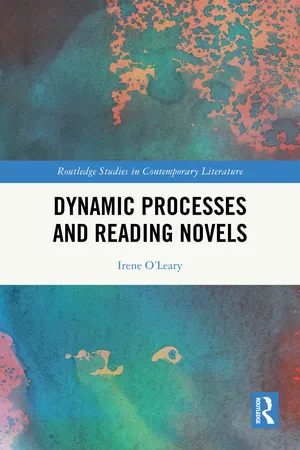
- English
- ePUB (mobile friendly)
- Available on iOS & Android
Dynamic Processes and Reading Novels
About this book
This book is about the dynamic processes that generate novel-reading. It takes the view that the world is composed of dynamic processes and introduces a process dynamics approach to articulate this stance. This fresh perspective draws on literary studies, process philosophy and neuroscience to argue that dynamic literary and microcognitive processes constantly reconfigure the conditions that they co-create during reading. Analyses of The PowerBook by Jeanette Winterson, The Curious Incident of the Dog in the Night-time by Mark Haddon and Oryx and Crake by Margaret Atwood consider style, narration, allusion and creativity in interaction with diverse microcognitive processes involved in reading. The analyses are strengthened by taking live action into account, illuminating changes that many critical perspectives miss or standardise and avoiding reliance on illusory ideal readers and readings. In proposing a process approach to dynamics and its analysis, this book paves the way for new research across disciplines.
Tools to learn more effectively

Saving Books

Keyword Search

Annotating Text

Listen to it instead
Information
Table of contents
- Cover Page
- Half Title page
- Series Page
- Title Page
- Copyright Page
- Dedication
- Contents
- Acknowledgements
- 1 Introduction
- 2 Theorising process dynamics
- 3 Perturbations, style and microcognition
- 4 Morpharchy, narration, working memory and time
- 5 Dispersal, allusions and memory
- 6 Creativity, fiction and reading
- 7 Conclusion
- Index
Frequently asked questions
- Essential is ideal for learners and professionals who enjoy exploring a wide range of subjects. Access the Essential Library with 800,000+ trusted titles and best-sellers across business, personal growth, and the humanities. Includes unlimited reading time and Standard Read Aloud voice.
- Complete: Perfect for advanced learners and researchers needing full, unrestricted access. Unlock 1.4M+ books across hundreds of subjects, including academic and specialized titles. The Complete Plan also includes advanced features like Premium Read Aloud and Research Assistant.
Please note we cannot support devices running on iOS 13 and Android 7 or earlier. Learn more about using the app